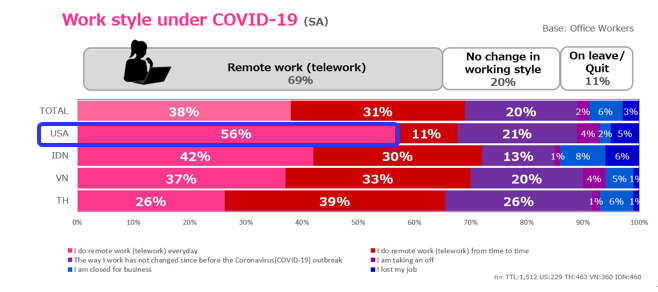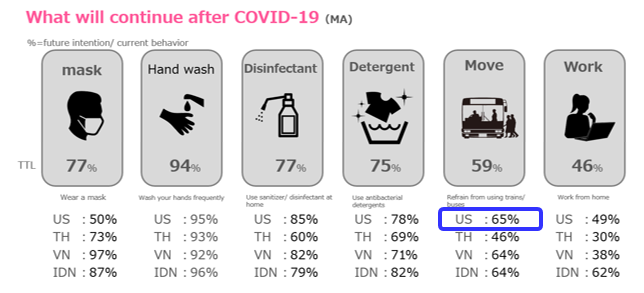【アメリカ】コロナ禍におけるアメリカ人のカーライフ
- 公開日:2020/08/17
- 5014 Views

車社会の米国に新型コロナウイルスはどのような影響を与えているのだろうか。米国の各州が外出禁止令(Stay at Home Order)を発令したのは3月下旬から。6月には外出制限や経済活動の再開が段階的に緩和されている中、弊社では自主企画調査としてオンラインの定量調査(US,TH,VN,ID)を5月初旬に、またオンラインの個別インタビュー(US)を6月中旬に実施した。その結果から見えてきた状況を一部ご紹介します。
コロナによるライフスタイル・ワークスタイルの変化とモビリティ


出典:(株)インテージ 自主企画調査より
では、なぜ乗り物に乗らなくなったのか、今後も控えたいと思っているのか、実際に行ったオンライン個別インタビューから事例としてご紹介します。
カリフォルニア州在住の30代男性はピアノやギターの先生。レッスンのオンライン化を兼ねてから進めていたが、外出禁止令が発令されて全てをオンライン上で行うスタイルに移行させました。また以前は毎日のように外食やジム通いで車に乗っていたのが、コロナ期間中から車での移動は週1~2回の生活必需品購入時のみ。この徹底した生活スタイル変更の根底にあるのは生後数か月の娘がいるということ。どの情報が確かかわからない状況で、できる限りの予防策を講じておきたいという様子がうかがえました。
実際のカリフォルニア在住男性の一日などは、こちらのリンクからもご覧いただけます。
ニュージャージー州在住の30代女性はヘルスケアコンサルタントとして独立したばかり。コロナ禍で夫婦ともに在宅勤務となったのですが、仕事はオンラインでほぼ滞りなく進められています。また必要最低限の日用品買出し時のみ週1~2回ほど車で外出するのですが、ネット購入を活用し不便さは感じていません。コロナ以前はビューティサロンやディナーに出かけることを楽しみ、週末には車や電車・飛行機で遠方まで足をのばすようなアクティブなライフスタイルだったが、独立して働く責任感と自身が「ヘルスケア」のコンサルタントという立場上、世間的にコロナが落ち着いてもしばらくは人との物理的な接触を最低限におさえようとする意思が感じられました。
事例の2名は、いずれもオンライン上での業務遂行が可能な環境を整えていて、それぞれ可能な限り感染予防策を講じたい理由があることが共通しています。
コロナによる自動車購入時の意識の変化は?
ではその予防策の1つとして、次の自動車購入で重視する点に変化はあるのだろうか。定量調査の結果では、アジア3ヵ国で8割が「車中の空気のきれいさ」重視率が高まるなど特徴的な変化がみられました。
出典:(株)インテージ 自主企画調査より
一方で米国の反応はこれらの国と比較するとおしなべて鈍い傾向がみられ、前出の2名も次期購入車を選ぶ際にコロナの影響は「購入時期を遅らせる」以外に見受けられませんでした。両名とも、コロナ以前に楽しんでいた外食やジム、週末の遠出などはコロナが落ち着いても当分の間控えると慎重な様子をみせていたが、こと車に関しては「空気清浄」や「抗菌素材」などキーワードを出してみても「他のSPECと同様に検討する」との姿勢を崩さなかったのです。
そもそもアジア諸国ほど大気汚染が深刻ではないこと、空間が広く「密」を警戒する必要があまりないこと、などが背景にあるのかもしれないですが、コロナの終息がみえない中で消費者の意識も刻々と変化している可能性は高く、車内の空気清浄まわりについても今後の消費者意識の動向に注視する必要があると考えられます。
-

執筆者プロフィール
石川 真穂(いしかわ まほ)
消費財メーカー様と耐久財メーカー様の海外マーケティングをパネルデータとカスタムリサーチ両面からサポート。今期は主にオンラインソリューションに携わる。3人の子育て中で一番の関心事は食生活であり、海外に行ったら必ずローカルスーパーでその国ならではの食品を買い、家族で試す。
-

編集者プロフィール
辰田 悠輔(たつだ ゆうすけ)
Global Market Surferのサイトづくりを担当。コロナ禍での気分転換のために、週末は車でサーフィンに出掛ける。
 Global Market Surfer
Global Market Surfer CLP
CLP